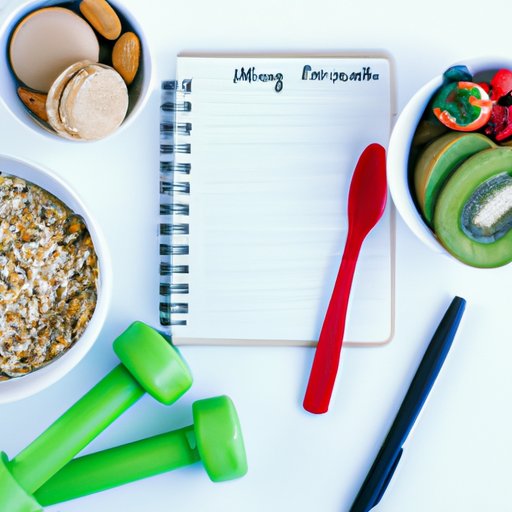
Introduction
Breakfast is often referred to as the most important meal of the day. It provides the necessary nutrients to fuel the body and brain for the long day ahead. But how many calories should you consume for breakfast? In this article, we will explore the recommended calorie range for breakfast, how to calculate your personalized calorie needs, and provide sample breakfast plans based on age, gender, and activity level.
Creating a Personalized Breakfast Calorie Calculator Tool
Calculating your personalized calorie needs is the first step in determining how many calories you should consume for breakfast. The number of calories required for each person varies based on age, weight, height, gender, and activity level. Using your BMI, weight, height, and age, you can determine your base metabolic rate. From there, you can calculate your daily caloric needs.
For example, a sedentary woman who is 30-years-old, 5’6″ and weighs 140 pounds would need around 1600 calories per day to maintain her current weight. However, if she led an active lifestyle, she would require an additional 500-1000 calories per day.
When it comes to breakfast, calorie needs will vary from person to person. However, a general rule of thumb is to consume 20-30% of daily calorie needs at breakfast. For the example above, that would mean consuming 320-480 calories at breakfast.
To ensure breakfast is meeting your caloric needs while still being healthy, consider including a mix of whole grains, lean proteins, and healthy fats in your meal, such as oatmeal with Greek yogurt and blueberries or avocado toast with an egg.
Sample Breakfast Plans Based on Calorie Intake
To help meet your breakfast calorie needs while maintaining a balanced diet, here are some sample breakfast plans based on age, gender, and activity level:
- For a sedentary woman, aged 19-30 years, consuming 1600-1800 calories per day: 1 slice whole-grain toast (80), 1/2 avocado (160), 1 egg (70), and 1 small apple (80).
- For an active man, aged 19-30 years, consuming 2600-2800 calories per day: 1/2 cup cooked steel-cut oats (150), 1 scoop whey protein (120), 1/2 banana (50), and 1 tablespoon almond butter (100).
- For a sedentary older adult, aged 60 years and over, consuming 1200-1400 calories per day: 1 slice whole-grain toast (80), 1 tablespoon peanut butter (90), 1/2 banana (50), and 1 cup nonfat Greek yogurt (120).
It is important to note that these are just sample plans and may not meet the specific needs of each individual. Individuals should consult with a registered dietitian to devise a personalized meal plan.
The Importance of Macronutrients and Metabolism
Macronutrients, including protein, carbohydrates, and fats, serve as the building blocks of a healthy diet. Eating meals that include all three macronutrients can help maintain blood sugar levels and provide sustained energy throughout the day. Additionally, protein and fiber can help you feel full and satisfied, reducing the likelihood of overeating throughout the day.
Protein, in particular, is an important macronutrient for breakfast. Research suggests that consuming high-protein meals, particularly at breakfast, can boost metabolism and promote weight loss.
When planning a well-balanced breakfast, it is recommended to include lean proteins, such as eggs, Greek yogurt, or nut butter, and complex carbohydrates, such as whole-grain bread or oatmeal. Adding healthy fats, such as avocado or nuts, can also provide sustained energy while promoting overall heart health.
Insights from Nutritionists on Breakfast Calorie Needs
Nutritionists emphasize the importance of consuming a well-balanced breakfast while remaining mindful of calorie intake. According to registered dietitian, Jenny Dang, “Breakfast sets the tone for the rest of the day. It’s essential to have a healthy meal that includes protein, fiber, and healthy fats to fuel the body.”
Registered dietitian, Kara Lydon, also highlights the importance of personalized meal planning. “It’s essential to recognize that everyone’s ideal caloric intake is different, and this amount can change based on individual factors, such as activity level, age, gender, and weight loss goals.”
Dang and Lydon both stress that breakfast is a crucial meal for overall health and wellbeing.
The Importance of Starting a Day with a Healthy Breakfast for Overall Wellbeing
Starting the day with a healthy breakfast has both physical and mental benefits. Consuming a well-balanced meal can lead to sustained energy levels throughout the day while keeping hunger at bay. Breakfast can also improve cognitive function, mood, and memory, leading to increased productivity at work or school.
Additionally, creating a healthy breakfast routine can lead to more mindful eating habits throughout the day and promote a healthy lifestyle overall. Making conscious food choices can lead to improved long-term health outcomes, such as reduced risk for chronic illnesses like heart disease and diabetes.
Conclusion
Breakfast is an essential meal that sets the tone for the day ahead. It provides necessary nutrients and helps sustain energy levels throughout the day. By calculating personalized calorie needs, making healthy choices, and including macronutrients in your breakfast meals, you can start the day off right. Remember to consult with a registered dietitian for personalized meal planning and use the breakfast calorie calculator tool to provide helpful guidance on how to maintain a well-balanced and healthy breakfast.




